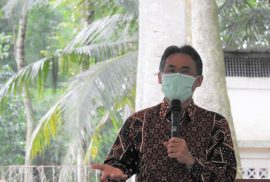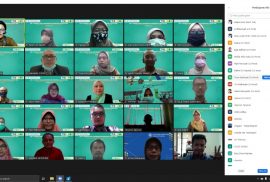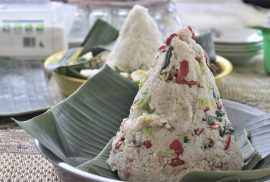As a supporting unit of Universitas Gadjah Mada (UGM), PIAT, which has been operating since 1975, is now growing. Located in the middle of a residential area of Tanjungtirto Village, Kalitirto, Berbah, Sleman, PIAT UGM starts 2021 by holding a meeting with Tanjungtirto residents. The meeting is a manifestation of gratitude to the Tanjungtirto residents for supporting PIAT’s operational activities thus far. It is also a means of discussion to listen to complaints and suggestions from the locals.Previously, UGM had first distributed 300 packages of food supplements, honey, and eggs on 3 January 2021 for the residents. Drs. Gugup Kismono, M.B.A., Ph.D. as the Rector’s Secretary was in charge to symbolically hand over the donation package.
New Release
The Center of Agrotechnology Universitas Gadjah Mada (PIAT UGM) held the international conference again on Thursday (3/12). The conference was entitled The 1st International Conference of Industrial Agriculture (ICONIA) which carried the theme Managing Crisis in Industrial Agriculture: Way Forward. This event was held in one day, and involving four partners of higher educational institution which are Gardening Polytechnic LPP of Yogyakarta, Janabadra University, Universitas Pembangunan Nasional “Veteran” Yogyakarta (UPNVY), and Sarjanawiyata Tamansiswa University.
PIAT UGM student flat project would be started soon. The project was symbolized by the placement of the first stone on last Friday (2/10). The event was attended by several stakeholders, including the internal staff, the Head of PIAT UGM (Dr. Ir. Taryono, M. Sc), the UGM’s Vice Chief of Research and Community Service (drg. Ika Dewi Ana, M. Kes, Ph. D), the UGM’s Chief of Sub-directorate, Directorate’s Infrastructure and Assets (Walyono, S. T., M.Eng.), and the external which was attended by the Commitment Officer whom also the representative of General Directorate of CNVWU Housing of Yogyakarta Province, Ministry of Public Work and the Public Housing Republic of Indonesia (Muh. Ridwan, S. T., M. T), the police chief of Berbah sector, the non-commissioned officer for village guidance of Kalitirto, and also the contractor representative of PT. Linggarjati Perkasa; PT. Samudra Anugrah Indah Permai KSO and PT. Delta Buana as the consultant representative.
On Thursday (3/9), the Center of Agrotechnology Innovation (PIAT UGM) signed the cooperation agreement for the self-management activity of Gentan Village, Baki Sub-District, District Sukoharjo, Central Java Province which represented by Dr. Ir. Taryono, M.Sc., the chief of PIAT UGM, and Uke Fransiska, S.H., the village chief. The signing of this agreement was also attended by PIAT UGM Secretary, Baki Chief’s secretary, and other members of the government and the members of the village consultative (BPD). The village government of Gentan through the BPD, Didik Haryono who had contacted PIAT UGM since 8th July 2020. Then, it is continued with the visit of the village government representative to see the process of waste processing at the House of Recycled Innovation (Rindu) PIAT UGM. The discussions for waste recycle kept going on until met the agreement to collaborate with PIAT UGM to make Gentan Village as the self-management waste village’s pioneer in Sukoharjo District, Central Java.
The urban’s food security is an important thing to realize at this COVID-19 pandemic. It is based on the limitation and the disturbance by the government’s policy (PSBB) that the food suppliers who mostly live in the village are getting more difficult to be reached.
The urban citizens are starting to realize the importance of consuming healthy cultivated crops. It later encourages the Kricak’s locals to create a farmer association called ‘Ngremboko’. The association has been established since 2015 and produces a program that utilizes the narrow and empty space of the people as cultivation land. This program is called Vegetable Village (Kampung Sayur) and Vegetable Alley (Lorong Sayur).
The population growth and the urbanization stream which are hard to handle are making the farmland changing shift into the industrialized, commercialized, or settlement area increased. The decreasing farmland impacts the food security of the urban area. This condition encourages the government and urban residents to fulfill the food needs independently. It also encourages to fix the environmental condition to create a healthy and quality environment.
One of the phenomena which are booming lately is an urban farm which utilizes the limited land. The urban farm is the key to establish a continual food system for urban residents. Furthermore, this could help to handle the food insecurity in the future. Moreover, the urban farm is not limited to the horticulture plant, but also with integrated cultivation freshwater fish, animal husbandry, or other fields through utilizing empty yards. This action would lead the family to increase their economy, establish healthy nutrition, and prosperous.
Covid-19 Pandemy does not shrink the Center of Agrotechnology (PIAT) UGM’s passion to become a productive unit. It uses the 11,8 Ha of land for farming, and for the corn-planting. The harvest of this corn is also quite satisfying. Until the mid of 2020, quality corn’s harvest gets 3.331kg.
The success of this harvest attracted the enthusiasm of the UGM’s chief to go down to the harvest land. This could be seen by the presence of the UGM Vice-Rector of Research and Community Service, drg. Ika Dewi Ana, M.Kes. Ph.D. on 5 June earlier. Accompanied by Chief of PIAT UGM, Dr. Ir. Taryono, M.Sc, and several members of the field coordinator, the activity went safely with keeping the health protocol which is published by the government.
The agriculture sector still holds an important role in Indonesia’s economic wheel. The crop’s treatment on the cultivation phase is done with a maximum effort to give the best harvest that could be sold for a high price. On Javanese culture, there is a tradition called Wiwitan, which keeps preserved up until now. Long ago, this tradition was made for Dewi Sri’s offering who gave fertility to the crops.
As time goes by, this tradition gets modified that is suited to the local belief without changing the equipment (uba rampe) which is used as the requirements. Uba rampe itself contains a philosophical meaning which consists of various old Javanese traditional food such as nasi megono, salted fish (gereh), tempe bacem, wajik, sambel gepeng, botok yuyu, and various jenang.
Recently, the government published a regulation to appeal the public to start work from home (WFH), learning from home (LFH), and also a massively social restriction (PSBB) as the effort of reducing the Covid-19 spreading. In order to support this regulation, the Center of Agrotechnology (PIAT) UGM is trying to redevelop the old programs that had been dimmed in recent years by giving a little innovation touch to the plan.
The goal of this movement is to provide a number of vegetables that are planted by PIAT. This movement is also supporting the government regulation through PIAT Shop. PIAT Shop is an idea that comes from the previous early April which goal is to provide the need of fresh vegetables, source of proteins, and also instant herbal drink to help us go through these massive social restrictions.
Many ways had been done by UGM in order to handle this pandemy. Recently, the UGM unit’s collaboration is getting intensified as an act for caring. Mainly for those who work on the front line or the civilians who are exposed to this impact.
The collaboration of Directorate of Civil Service (DPkM) and Center of Agrotechnology Innovation (PIAT) is one of them. It is not the first to be introduced. The prior collaboration of the two was on the 2019’s First Period of Student Study Service (KKN). The collaboration’s goal is to distribute seeds for the agro cluster student. This time, the goal is to provide the source of nutritions and vitamins to strengthen the immune system.









